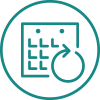
POCT Urinalysis

POCT Urinalysis
Purpose:
The Weqas POCT Urinalysis EQA programme aims to assess the performance and reliability of organisations undertaking POC Urinalysis tests in a wide variety of healthcare situations.
Urinalysis are an array of tests undertaken on a sample of urine to screen and assess a wide range of disorders, including Urinary Tract Infection, Kidney Disease, Liver or biliary disease and Diabetes. Laboratory Urinalysis can include three testing phases: visual examination for colour, clarity and concentration, semi quantitative or qualitative chemical analysis for specific gravity, pH, protein, glucose, blood, leucocyte, nitrite, bilirubin and urobilinogen, and microscopic examination for the identification of cells, casts, crystals and bacteria. Chemical analysis is undertaken using test strips which are composed of test pads impregnated with reagents for each respective test. The strip is dipped in urine and the colour change on the pads read after a predetermined time period. This process can either be manual or automated (machine read). Point of care (POC) Urinalysis tends to refer to the first two testing phases and does not include microscopy. Specific strips (cartridges) are also used for the determination of Urinary albumin, often termed microalbumin, and the Albumin/ Creatinine ratio as part of the assessment of kidney disease.
Scope:
The base material is fresh filtered human urine, to which additional analytes such as leucocytes, nitrites, ketones, blood, protein, albumin, bilirubin and glucose are added at an appropriate physiological range to reflect the concentration range in clinical samples. Additional challenging samples are distributed to assess diagnostic accuracy near the cut points, method interferences and for educational purposes.
5mL volume of human urine is distributed bimonthly, with a minimum of 6 samples distributed over the year covering a clinically relevant range for screening. Both manual and automated POCT device results can be submitted as qualitative (neg, pos, or +,++,+++) or semiquantitative results (e.g. range band 2-5mmol/l).
Performance Assessment: Performance is assessed against the correct interpretation, based on the clinical relevance and the laboratory analysed quantitative target value and / or spiked concentration. The scores broadly reflect clinical importance, where a score of 0 is for a correctly classified concentration range and 4 represents a gross misclassification of the result. The sensitivities of the strips and their intended purpose are also considered in the scoring. In general, a missed positive sample is given a larger penalty than a misclassified negative as this could lead to missed diagnosis, follow up or inappropriate treatment whilst an incorrect negative tends to lead to less severe clinical consequences such as inappropriate further investigation.
 |
Key Features:
|
| POCT Urinalysis Programme | ||
|---|---|---|
| Analyte | Approx. Range Covered | |
| Glucose | 0 - 60 | mmol/L |
| Ketones | 0 - 20 | mmol/L |
| Protein | 0 - 5 | g/L |
| Haemoglobin (Blood) | 0 - 7500 | µg/L |
| Specific Gravity | 1.005 - 1.020 | |
| pH | 6 - 8 | |
| Bilirubin | 0 - 50 | µmol/L |
| Urobilinogen | 0 - 200 | µmol/L |
| Leucocytes | 0 - 500 | µl esterase/L |
| Nitrites | 0 - 40 | µmol/L |
| Albumin / Creatinine | 0.8 - 78 | mg/mmol |
| Urine Albumin (Microalbumin) | 0 - 200 | mg/L |
| Creatinine | 1 - 22 | mmol/L |
Related Documents








